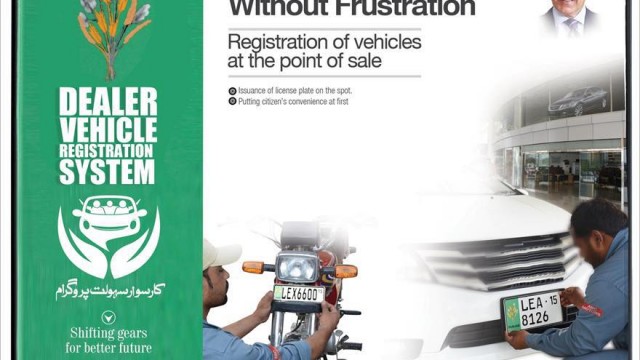Vehicle Registration, Fines: Cabinet Committee Greenlights New System
The Punjab Cabinet Committee on law and order has approved introduction of Dealer Vehicle Registration System and camera integrated fining on traffic rules violations in the province, and the required amendments to the relevant laws.
The committee also approved Rs100 increase in fines for all traffic violations by motorcyclists and Rs300 to Rs500 increase in fine for juvenile driving.
The proposals were made by Chief Minister’s Special Monitoring Unit on Law and Order head Salman Sufi and are a part of an overall plan to improve motor vehicle registration and traffic systems in the province.
The chief minister had approved the plan last summer. However, he had suggested that the matter should be discussed by the Cabinet Committee when a summary, initiated by the Punjab IGP, was sent to him by the Home Department.
Presiding over the meeting at the Civil Secretariat, Law Minister Rana Sanaullah Khan reportedly said a formal mechanism must be in place to ensure payment of all traffic fines by people.
Mr Salman Sufi suggested that the owners of vehicles could be asked to pay their traffic fines at the time of transfer of vehicle or payment of token tax.
Punjab IGP Mushtaq Sukhera suggested that RFID (radio frequency identification device) chips could be installed in the licence plates. The RFID readers installed at various points on the roads would detect the non-payment of fines. And in this case the spotted vehicles could then be stopped to make their owners pay their fines.
Official sources said it was decided that other avenues would also be explored to ensure payment of fines by traffic rules violators.
Official sources said the Committee agreed to give traffic personnel a share in revenue from camera integrated fining as incentive and also for purchasing their equipment. Through this reform, the Traffic Department would no longer have to come to the government each year to demand funds.
It was decided to give a share to the Excise and Taxation Department in revenue collected by it.
Mr Salman Sufi informed the Committee about SMU’s reforms in the Excise Department and explained that under the Dealer Vehicle Registration System, the registration and licence plate issuance would be done at the point of sale, the dealership. The vehicle would not be allowed to leave the dealership premises without being registered first. This reform would not only solve the core issue of unregistered vehicles but would also provide customers with convenience in getting their vehicles registered.
After the successful rollout of this system, a deadline would be announced after which no “applied for” vehicle would be allowed to be operational on Punjab roads. Any such vehicle would be impounded.
He said the Excise Department had already sent a summary to the Chief Minister for seeking an approval to proposed amendments to law, incorporating licence plate ownership change from the owner to the vehicle, triggering issuance of new licence plate upon the transfer of an existing one. As licence plate would be owner’s identity, fines would be attached to the licence plate. This Committee also approved this proposal.
The meeting was attended also by Special Assistant to Chief Minister Rana Maqbool Ahmad, the Home, Law and Excise Secretaries and other officers concerned.
This news was previously published in DAWN and it is being republished here with permission.


